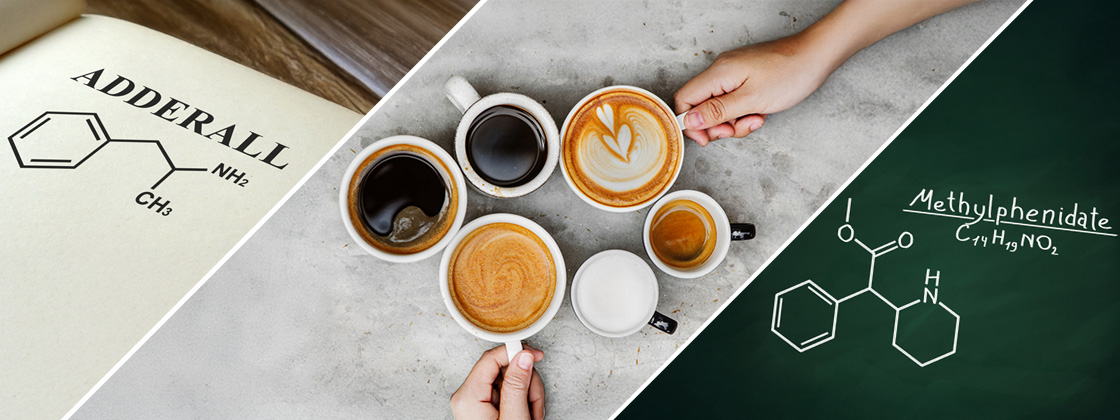For many adults and children with ADHD, staying alert and organized can feel like an uphill battle. Some turn to caffeine for a quick boost, while others rely on stimulant medications prescribed by a doctor. While both can increase alertness, they differ significantly in the way they affect the brain and impact attention.
Dopamine vs. Adrenaline: Why It Matters
- Caffeine boosts adrenaline, making you more alert, jittery, or awake, but it does not reliably improve focus or task completion for people with ADHD.
- Stimulants increase dopamine, which is critical for the ADHD brain because giving the ADHD brain regulated dopamine levels can help with task initiation, working memory, and goal-directed behavior.
Pharmacokinetics: How They Work in the Body
Caffeine
- Rapidly absorbed in the gut, with peak blood levels reached within 30–60 minutes.
- Half-life: 3–7 hours, depending on individual metabolism.
- Primarily acts as an adenosine receptor antagonist, indirectly increasing levels of adrenaline (epinephrine), which promotes wakefulness and alertness.
- Does not directly increase dopamine in prefrontal cortex circuits associated with executive function.
Stimulant Medications (e.g., methylphenidate, amphetamines)
- Absorbed and metabolized differently depending on formulation (immediate vs. extended-release).
- Peak effects occur 1–3 hours post-ingestion for immediate-release forms.
- Directly increase dopamine and norepinephrine in the prefrontal cortex and striatal circuits.
- This targeted action enhances executive function, working memory, and the ability to focus on goal-directed tasks.
Divergent vs. Convergent Attention
Divergent Attention:
- The ability to generate multiple ideas, brainstorm, or make creative connections.
- Caffeine often enhances divergent attention, helping with idea generation and initial task motivation.
Convergent Attention:
- The ability to focus on a single solution, organize information, implement ideas, and complete tasks.
- ADHD brains typically have excess divergent attention but struggle with convergent attention.
- Stimulants help increase convergent attention, which is exactly what is needed to organize, plan, and execute tasks successfully.
Summary:
Caffeine can boost overall alertness, creativity, and initial motivation, making it a useful tool for certain situations. However, it does not address the core executive function deficits in ADHD, such as organizing tasks, implementing ideas, or sustaining focus. Stimulant medications remain the most evidence-based intervention for improving convergent attention, working memory, and task completion.
Common Misconceptions About ADHD Medications
There are a lot of myths about ADHD medications. Many people worry they’re addictive, will turn a child or adult into a “zombie,” or even increase the risk of substance abuse later in life.
The truth? When taken as prescribed, ADHD medications are safe and not inherently addictive. In fact, research shows that treating ADHD properly with stimulants may actually lower the risk of future substance use, because better focus and impulse control reduce risky behaviors (Barkley, 2013).
ADHD medications don’t numb emotions or make someone “flat”—instead, they help the brain focus, stay motivated, and follow through on tasks. By enhancing dopamine and norepinephrine signaling in key areas of the brain, stimulants improve executive functions such as working memory, cognitive flexibility, and self-regulation, allowing individuals with ADHD to plan, organize, and complete tasks more effectively (Arnsten, 2009).
Effective treatment doesn’t change who someone is—it helps them become an easier version of themselves. With ADHD symptoms better managed, individuals can express their personality, creativity, and energy in ways that are more intentional and less frustrating for themselves and those around them. They’re still the same person, just with tools and regulation that make daily life and relationships smoother.
The key is the right dose, careful supervision, and regular check-ins with a healthcare provider.
Practical Takeaways
| Effect | Caffeine | Stimulants |
| Alertness | ✅ Increased | ✅ Increased |
| Idea generation / creativity | ✅ Enhanced | ⚪ Neutral |
| Task initiation | ✅ Can help | ✅ Strongly improves |
| Working memory | ⚪ Little effect | ✅ Significant improvement |
| Task organization & completion | ⚪ Minimal | ✅ Strongly improved |
| Dopamine (focus & motivation) | ⚪ Minimal | ✅ Directly enhanced |
| Adrenaline (energy & wakefulness) | ✅ Directly enhanced | ⚪ Secondary effect |
References:
- Barkley, R. A. (2013). Taking Charge of ADHD, 3rd Edition. Guilford Press.
- Cheyette, S. (2023). “Caffeine Is Not a Good Alternative to ADHD Medication.” ADDitude Magazine. Read more
- Barkley, R. A. (2015). Attention-Deficit Hyperactivity Disorder: A Handbook for Diagnosis and Treatment (4th ed.). Guilford Press.
- Koppelstaetter, F., Poeppel, T. D., Siedentopf, C. M., Ischebeck, A., Verius, M., Haala, I., … & Krause, B. J. (2008). Caffeine influences cerebral activation in the Stroop task. NeuroImage, 39(1), 269–275.
- Volkow, N. D., Fowler, J. S., Wang, G. J., & Swanson, J. M. (2004). Dopamine in drug abuse and addiction: results from imaging studies and treatment implications. Molecular Psychiatry, 9(6), 557–569.
- Arnsten, A. F. T. (2009). The Emerging Neurobiology of Attention Deficit Hyperactivity Disorder: The Key Role of the Prefrontal Association Cortex. The Journal of Pediatrics, 154(5), I–S43.


